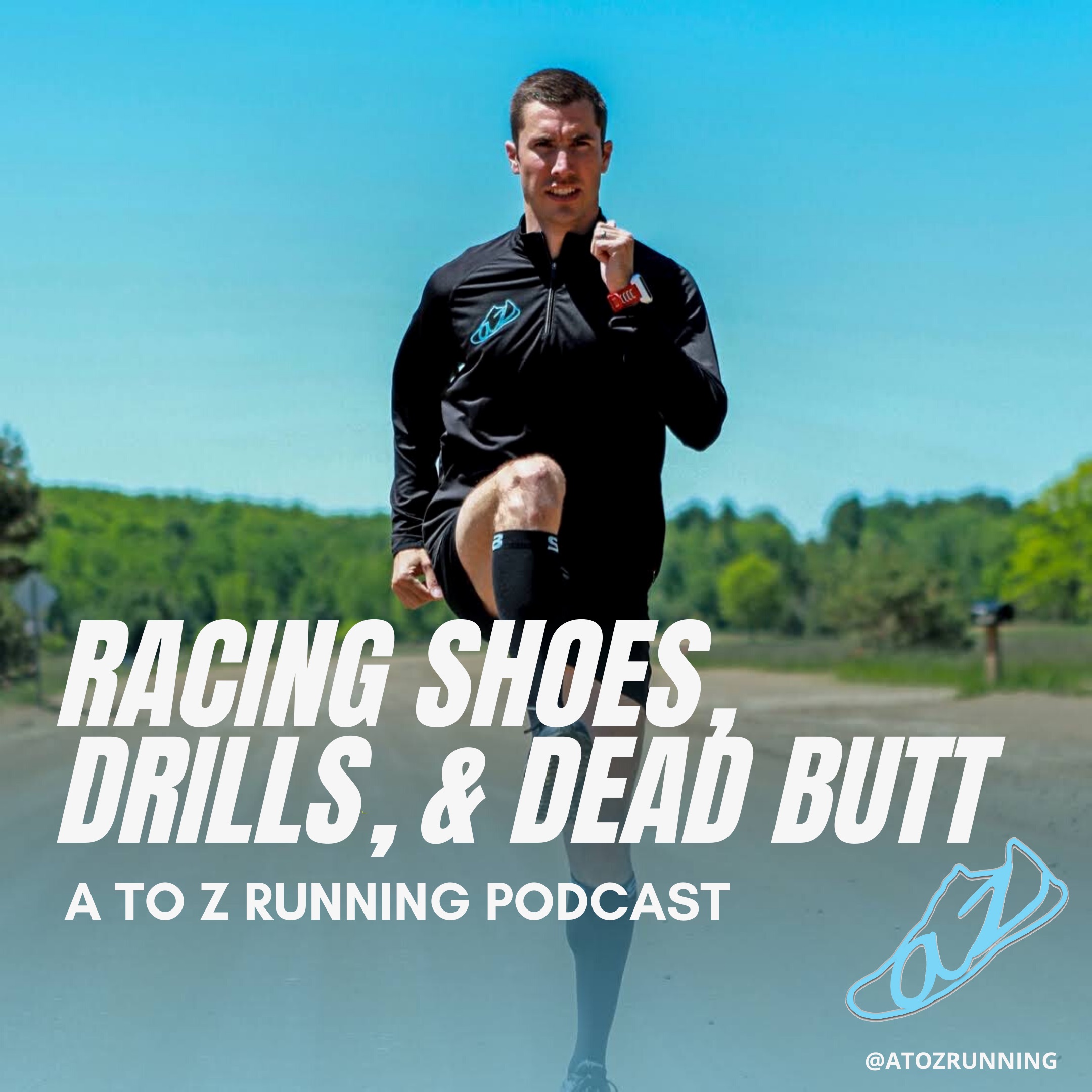LISTEN
In this episode of the A to Z Running podcast Zach and Andi and listener Q & A about racing shoes, drills, and dead butt!
Keep listening for a fast international half marathon, a heart-warming victory, and more in the world of running segment!
INTRO
-
-
- FOLLOW and SUBSCRIBE
- Thanks for joining in on the conversation on social media.
-
MAIN TOPIC: Racing shoes, Drills, and Dead Butt
Today’s episode comes from questions you’ve sent into A to Z Running!
Question: How often should I wear race shoes?
From Amanda (and Erin) from Michigan
How often should I wear race shoes in training?
Relevant episode: What is essential for healthy feet? With Dr. Bill Johncock
Our thoughts:
When we posed this question to Dr. Bill Johncock, he told us that the consideration for foot health is the stack height, heel to toe, and shoe stiffness. Most road racing shoes now have a more similar stack height to trainers. When you are wearing spikes, there needs to be more consideration.
He recommends having a pair of shoes in rotation with a transitional heel to toe drop as your race footwear. You also want to do some workouts in the spikes.
Considerations:
Is there a significant difference in your heel to toe drop between your training shoes and your race shoes?
Have you felt good in the shoes during other races or trial runs?
Super shoes have been known to reduce the amount of recovery time needed, but you also lose out on some adaptations… consider the trade off.
Race shoes do not last long. You don’t want to wear them out.
In summary:
First do a shorter workout in the shoe.
If a shorter workout or run goes well, do a long workout (is your goal race is a half marathon or more) race. An hour or more would be ideal.
Question: How to strengthen if I have Achilles issues?
Dr. Bill from North Carolina
How do you balance the reality of the imbalance of posterior muscle groups (calves- gastric-soleus complex and hamstrings) becoming too strong and tight and the anterior muscle groups becoming too weak?
Are there general guidelines for emphasizing exercises like single leg squats to build the anterior muscle groups and are there risks to calves and Achilles by performing exercises like calf raises and plyometrics? Ways to mediate those risks. Asking for a friend recovering from a partial Achilles tear. Thanks!
- Unique challenge of achilles is blood flow (lack)
- Recovery is slow
- Aiding blood flow and recovery methods is helpful
- Remember functional movement focus
- Address further observable weaknesses in isolation
- Always approach mobility with a comprehensive mindset
Question: What is the purpose of drill and which ones should I do?
Luke from Michigan
One thing I am curious about is the specific role that drills (e.g., A-jumps, high knees, karaoke) play in creating better running mechanics. While I value drills as a warmup, I have never considered them as having a substantial impact on my running mechanics, nor have I typically thought of them as such an indispensable part of my training. I agree about the central importance of mechanics in general (albeit with some nuance to account for individual physiological differences), but I am having a hard time connecting how- and which- drills will improve my running form. I am thinking I need to readjust my priorities, as I have also tended to think that strengthening through weights and plyos was my best way of staying injury-free (and thus have tended to prioritize them over drills).
Our thoughts:
The runner is very effective at getting the job of running done. We are so effective, in fact, that we can often run without properly firing some muscles, which results in imbalance and overworking certain muscles.
- You are doing strength stuff, but when and what?
- From conversation: in the weightroom, doing other strength stuff, but what am I missing?
Drills are multi-functional.
- Different focuses at different times in training.
Why do drills?
Drills do three things:
- Improve neuromuscularity (the communication between the mind and body to perform a task most efficiently) as well as fire the muscles so they remember their function- often called muscular activation
- Muscle activation: “The motor nerve stimulates an action potential (impulse) to pass down a neuron to the neuromuscular junction. This stimulates the sarcoplasmic reticulum to release calcium into the muscle cell.” (Source)
- Along those same lines the results of neuromuscular work: Proprioception (muscle memory)- your ability to move without thinking.
- Strengthen the specific muscles and joints used for running, specifically those for balance and power.
Translation: Help your muscle firing to be more efficient which makes you a better runner and helps to prevent injury.
Which drill should I do?
- Skip with arm swing- Open up your upper thoracic, ease your muscles into a warm up skip.
- Lateral shuffle with arm swing
- Dribbles – ankle steps (Increase your running step rate)
- High knee run
- Butt kick run
- A-skips
- Alternating A-skips
- Skip for height
- Skip for distance
Question: How to overcome Dead Butt Syndrome?
Crissy
I was sick for like three months and ended up getting myself a good ol fashioned case of dead butt syndrome.
What are your thoughts on running with DBS?
- This is a weakness combined with overuse issue
- You were off your rhythm for a while, then in trying to get back in (or even if training intermittently)
- Too much or too hard
- Not enough time building strength in general
- Consider things you can do to shore up the strength side of things
- And ease in to training when you are able to find a rhythm again
- The running drills we just mentioned about- The B Skip in particular can help with this.
- Stand on a curb, one foot on, affected foot off and dip down in a controlled fashion, return
- Lunges
- Bridge with a band, make sure the hips stay neutral
- Leg extensions (Myrtl includes glute activation)
https://www.atozrunning.com/how-to-activate-glutes-for-running
WORLD OF RUNNING
World of Running
AtoZrunner updates: Andrea and Andrew Ridge Run 15k
#1. Istanbul Half Marathon
- Before the run, there was the roller skating again (you may remember us mentioning it last year)
- Both races went out FAST!
- Women’s Race
- 6 women went in with sub 67min debuts
- Last year Obiri finished third in Istanbul in 1:04:51 – the fastest debut half marathon in history.
- Helen Obiri came back from that record breaking debut to win dominantly in the women’s race while placing 16th Overall. 1:04:47
- Hellen Obiri 14:45 for her first 5k which is 62 min half pace
- Hellen Obiri takes off a day each week
- Behind her was Tsehay Gemechu by over a minute in a world class time of 1:05:51
- Men’s Race
- Men’s race went out at a world record pace, then it slowed a lot.
- Rodgers Kwemoi broke away just after halfway and won way under the sub hr mark with a 59:14, 58:30 is his best
- Daniel Mateiko 1:00:04
- Notably, Emmanuel Bor of the USA 1:00:19 (He was the pacemaker, but finished the race)
#2. Heartwarming Victory
(Source)
- Life has been hard (understatement) for Ukrainian refugee Valentyna Veretska.
- Veretska fled to Poland with 11-year-old daughter a month ago while husband stayed behind to fight in the Ukrainian army. In that month, she wasn’t able to train.
- She was invited to participate in the Jerusalem Marathon, which she ended up winning in a time of 2:45:54.
- “I have not trained for almost a month but when I saw the marathon in Jerusalem I thought I need to run. I need to show the world that peace and love is the most important thing. I hope this can show the world that we can participate together not just in running but in life. I hope for peace in my country very soon.”
- Valentyna was the only woman to break 3hrs in the race
#3. Insight into Eilish McColgan’s Training
- Two workouts and a long run.
- Lower mileage due to a foot injury.
- Cross trains her “second run.”
- Touches on 10k speed, recommending interval training.
- Keeps her goals focused on herself and doing her best, not the records.
- She attributes her success to ”training smarter” instead of “overtraining.” Interested in a training plan and/or coaching? We offer personalized support to help you achieve your goals! KEEP LISTENING



 CC by 2.0 Dave Atkinson CQ-7552 2018, 5th Avenue Mile
CC by 2.0 Dave Atkinson CQ-7552 2018, 5th Avenue Mile
Leave a Reply
Want to join the discussion?Feel free to contribute!